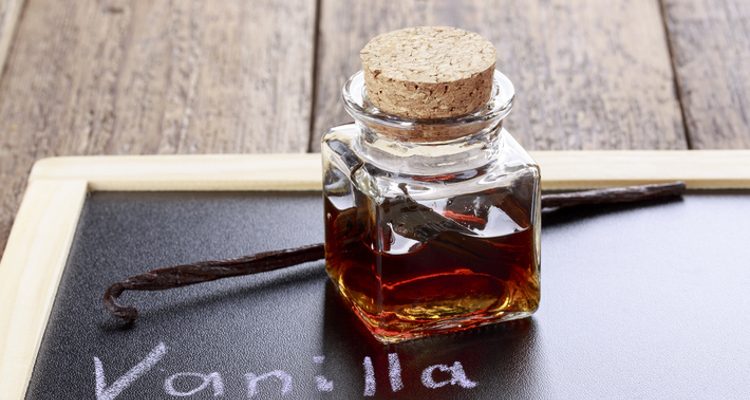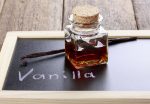
With all the new discoveries in food and nutrition that occur on a regular basis, it’s hard to keep track of what’s good for you and what’s bad for you anymore.
We decided that we would help out on one of those particular topics. Is vanilla extract bad for you? What are the health benefits of vanilla extract? We’ve taken a look to help clear up some of the misconceptions surrounding this tasty extract, and we’ll get to the bottom of the question, “Is vanilla extract bad for your health?”
Is Vanilla Extract Good or Bad for Your Health?
Is vanilla extract bad for you? In a word, no. Like any food product, vanilla extract is not bad in moderation. Use it too much, and you might get some issues, but overall, vanilla extract is not bad for you. Natural vanilla extract is made from the vanilla bean, a plant.
Pure vanilla extract is generally safe, even if you’re pregnant. As to how good vanilla extract is for you, you must look at vanilla extract nutrition data for a complete view and how your body can use it.
Health Benefits of Vanilla Extract
Now that we have all the facts, how do they equate to your health? Are there any real positives of vanilla? In fact, there are a number of vanilla extract benefits and some of them may surprise you.
1. Rich in Anti-oxidants:
Vanilla beans contain a number of antioxidants that are good for you. These antioxidants are believed to be essential to keeping damage done by free radicals at bay. This can lead to better skin and heart health. It should also be noted that vanilla extract manages to keep most of its antioxidant properties when going from vanilla bean to extract.
The Journal of Agriculture and Food Chemistry published a study that revealed vanilla extract keeps anywhere from 28% to 90% of the vanilla bean’s antioxidants.
2. Might Lower Cholesterol:
Vanilla extract may help with lowering cholesterol. While studies on humans are still pending, there have been a few studies where vanilla extract did lower cholesterol in rats, including one often-cited study published in the Indian Journal of Experimental Biology. If this works for humans as well, it could be an easy and delicious way of lowering cholesterol in your diet.
3. Reduces Inflammation:
There is also some evidence to support the idea that vanilla extract can help reduce inflammation on the body, especially the liver. This is in part due to the antioxidants that are present in vanilla extract.
The great thing about these benefits is that vanilla extract is relatively easy to add to your diet. It can be as easy as adding it to a fruit smoothie first thing in the morning, or perhaps in your cereal at breakfast. As it turns out, it’s almost as easy to make your own vanilla extract at home.
Vanilla Extract Nutrition Facts
| Vanilla Extract, natural, 1 cup | |
|---|---|
| Calories | 599 |
| Calories from Fat | 1 |
| % Daily Value | |
| Sodium 19mg | 1% |
| Total Carbohydrates 26g | 9% |
| Calcium | 2% |
| Iron | 1% |
| Riboflavin 0.2mg | 12% |
| Manganese 0.5mg | 24% |
| Magnesium 25mg | 6% |
| Potassium 308mg | 9% |
| Sodium 18.7mg | 1% |
One cup of a natural vanilla extract is a very large amount, but it does give a good representation of the nutritional value of vanilla extract. It should also be noted that this is the nutritional value for natural vanilla extract as opposed to synthetic vanilla extract.
According to SELF Nutrition Data, the calories of vanilla extract are high when talking about a cup (one tablespoon has 37 calories in comparison). Carbs are mostly in the form of sugar and there is no dietary fiber. It also lacks major vitamins.
However, vanilla extract does have some positives. It has some amounts of omega-3 and omega-6 fatty acids, and does not have saturated fats and cholesterol. It also has a decent amount of minerals, especially magnesium and potassium.
How to Make Your Own Vanilla Extract
Homemade vanilla extract doesn’t require a lot of ingredients or a lot of effort. Here is a basic recipe you can try at home.
Vanilla Extract Recipe
Ingredients:
- 3 to 5 vanilla beans
- 8 ounces alcohol (most common choices are brandy, rum, bourbon, and vodka)
Directions:
Split the vanilla beans down the middle and place them in a sealable container like a jar.
Take the alcohol of your choice and pour it into the jar on top of the beans. Seal the jar and place it somewhere in a cool and dark place for a month.
After a month, when using it, you have the choice of straining the beans from the liquid or just leaving them in.
If you want to make this without alcohol, you can replace the alcohol with food-grade glycerin, but keep in mind, you want the alcohol-free glycerin.
Now that you know how to make your own vanilla extract, it’s time to look at what you can use it for in the world of cooking.
Using Vanilla Extract in Cooking
The great thing about vanilla extract is that it’s very versatile in its use in the kitchen. Baking is an obvious use, with vanilla extract adding its flavor to all manners of bread, cookies, and tasty treats. But that’s not all you can add vanilla extract to.
It works well with several different breakfast items such as smoothies, porridge, French toast, cereal, and pancakes.
It also has uses outside of sweet foods. Vanilla extract can be found in things like vanilla tea, sweet potato casserole, and even a lobster dish with vanilla beurre blanc, where the sweetness of the vanilla is used to counterbalance the taste of the lobster.
There’s much more to the use of vanilla extract in the kitchen, so don’t be afraid to explore your recipe books and web sites. Look for new uses for vanilla extract, as there’s a much wider selection of dishes than you may have considered.
Easy to Make and Not Bad for You
By and large, vanilla is safe to consume with the kind of quantity that is normally used in foods. Minor side effects are normally faced by people who manufacture vanilla extract. It may cause insomnia, skin irritation, and headache.
The great thing about vanilla extract is that it’s really easy to make. All you have to really do is cut the bean and pour alcohol into the same jar. It’s also very easy to use. Add a few drops into whatever you’re making and it’s done. In addition to all of this and its sweet flavor, vanilla extract also has health benefits that cannot be ignored.
Sources:
“Studies on the antioxidant activities of natural vanilla extract and its constituent compounds through in vitro models,” National Center for Biotechnology Information; https://www.ncbi.nlm.nih.gov/pubmed/17715988, last accessed February 17, 2017.
“Evaluation of the antioxidant, anti-inflammatory and hepatoprotective properties of vanillin,” National Center for Biotechnology Information; https://www.ncbi.nlm.nih.gov/pubmed/21777577, last accessed February 17, 2017.
“Vanillin Production from Lignin and Its Use as a Renewable Chemical,” ACS Publications; http://pubs.acs.org/doi/abs/10.1021/acssuschemeng.5b01344?journalCode=ascecg&, last accessed February 17, 2017.
“VANILLA,” WebMD web site; http://www.webmd.com/vitamins-supplements/ingredientmono-206-vanilla.aspx?activeingredientid=206&activeingredientname=vanilla, last accessed February 17, 2017.
“Vanilla Extract Nutrition facts and Calories”, SELF Nutrition Data; http://nutritiondata.self.com/facts/spices-and-herbs/219/2, last accessed February 17, 2017.
Shyamala B. N., Madhava Naidu, M., Sulochanamma, G., and Srinivas, P., “Studies on the Antioxidant Activities of Natural Vanilla Extract and Its Constituent Compounds through in Vitro Models,” Journal of Agriculture and Food Chemistry, 2007; http://pubs.acs.org/doi/abs/10.1021/jf071349%2B.













